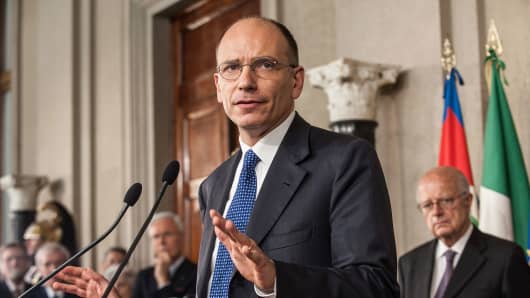Italy's new Prime Minister Enrico Letta won French backing on Wednesday for calls to spur economic growth alongside budget rigor, but problems lay closer to home with coalition partners demanding tax cuts that would blow a hole in the budget.
Letta, who took his message to Berlin on Tuesday, met French President Francois Hollande and said he was "100 percent satisfied" with the meeting and Hollande's response to his calls for Europe to start focusing on growth as well as consolidation.
Hollande said after the meeting: "Europe has to do the maximum it can for growth."
German Chancellor Angela Merkel struck a conciliatory tone in Berlin but gave no sign that she was willing to change her government's tough approach to the heavily indebted countries of southern Europe, insisting there was no contradiction between growth and fiscal consolidation.
Letta has held back from calling publicly for a relaxation of deficit targets Italy has vowed to meet this year, although several ministers and prominent politicians including his coalition partner Silvio Berlusconi are pushing him to do so.
"Our government's choice is to maintain the commitments we have made towards the European Union and, within those commitments, to make the choices which we think are needed for our country to have more room for growth and lower taxes," he said after the meeting with Hollande.
Letta, who goes to Brussels later on Wednesday, said he would not be discussing concrete tax measures with European Commission President Jose Manuel Barroso until the government had held further discussions with parliament.
However, the gap between his anti-austerity rhetoric and the hard choices his potentially unstable left-right coalition faces have already become apparent in a battle over the hated IMU housing tax introduced by former Prime Minister Mario Monti.
The tax, among the most unpopular steps Monti took last year to calm market panic over Rome's huge public debt, has become a symbol of what many in Italy see as austerity imposed by Brussels after the fall of Berlusconi's last government in 2011.
Berlusconi, who could bring down Letta's coalition of the main center-right and center-left parties at any time, repeated on Tuesday that abolishing the tax and repaying contributions paid in 2012 was a condition for his continued support.
Letta has promised to suspend contributions due in June, pending a wider review of property taxes but he has held back from meeting Berlusconi's demands, which would cost an estimated 8 billion euros.
Even so, he has not explained where he will find around 2 billion euros to cover freezing the tax in June, with local governments, the main beneficiaries of the levy, waiting anxiously to see whether they have to seek savings elsewhere.
"Two and Two Don't Make Eight"
"I don't think political parties can ask for arithmetic to be different from what we learned at school," Flavio Zanonato, Letta's Industry minister who is still also serving as mayor of the northern city of Padua, told the daily Corriere della Sera.
"Two and two don't make eight and if we abolish IMU on primary residences we'll have to close down the town halls."
Ratings agency Fitch welcomed the formation of the new government but noted that it had little room for maneuver on public finances and may not last long enough to deliver the structural economic reforms needed to increase growth.
"Letta's first outline of his government's program, in a speech to parliament on Monday, lacked important detail on how major tax reductions will be funded," it added.
Italy has committed to maintaining a budget deficit of 2.9 percent of gross domestic product in 2013, just under the European Union's 3 percent ceiling and expects to emerge in May from the so-called excessive deficit procedure it has been under for breaking the limit in previous years.
That has left the government squeezed between keeping its promises to European partners and maintaining the delicate balance within the coalition while confronting an economic crisis that has put a severe strain on Italian society.
While Berlusconi's center-right People of Freedom (PDL) party is insisting on scrapping the housing tax, many in Letta's own center-left Democratic Party (PD) want to put the focus on stopping a planned one percentage point rise in sales tax due to come into effect in July.
Some ministers, including Zanonato, have floated the idea of excluding spending on investment from EU budget deficit calculations, but that idea has got nowhere in the past and there has been no sign from Brussels of readiness to reconsider.
More details are expected next week but the dispute over tax is just one problem facing Letta, who has also promised to beef up Italy's inadequate welfare system and cut taxes on companies hiring young workers.
In the longer term, he has spoken little of the kind of structural reforms to the economy that might improve Italy's chronic lack of competitiveness and pull it out of a recession set to match the longest since World War Two.
Improving the much criticized labor law introduced by Monti's government last year or opening up closed professions could provide a longer term boost to growth and ease the pressure on squeezed public finances.
But any prospect of that will require him to negotiate the tensions already testing his government.


